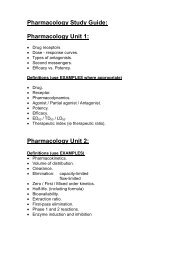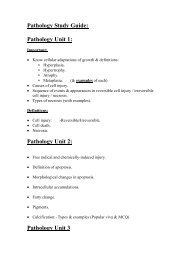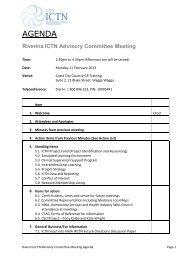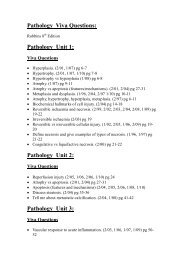Network principles for prevocational medical training - HETI
Network principles for prevocational medical training - HETI
Network principles for prevocational medical training - HETI
You also want an ePaper? Increase the reach of your titles
YUMPU automatically turns print PDFs into web optimized ePapers that Google loves.
<strong>HETI</strong> NETWORK PRINCIPLES<br />
3 Being an advocate <strong>for</strong> the professional development of trainees by:<br />
zz<br />
zz<br />
ensuring procedural fairness<br />
maintaining independence from line management<br />
zz<br />
addressing system-wide issues.<br />
4 Liaising and attending meetings with relevant groups and individuals in the <strong>training</strong> and<br />
education of trainees including:<br />
zz<br />
zz<br />
zz<br />
zz<br />
zz<br />
zz<br />
zz<br />
zz<br />
Term Supervisors<br />
<strong>Network</strong> Committee <strong>for</strong> Prevocational Training (NCPT)<br />
General Clinical Training Council<br />
Directors of Medical Services<br />
Visiting Medical Officers<br />
JMO Managers and administrative staff<br />
Hospital Executive<br />
Other DPETs within the <strong>Network</strong><br />
zz<br />
<strong>HETI</strong>.<br />
5 Managing the DPET funding through the Director of Prevocational Education and Training cost<br />
centre.<br />
6 Developing a DPET succession plan.<br />
Skills, knowledge and experience – selection criteria<br />
1 Medical graduate with clinical postgraduate qualifications<br />
2 A clinical appointment to practice at the hospital<br />
3 Qualifications, appointment and experience at a level sufficient <strong>for</strong> communicating on<br />
authoritative terms with senior consultants acting as term supervisors<br />
4 A commitment to and confidence in improving the quality of education and <strong>training</strong> offered by<br />
the hospital<br />
5 An understanding of the <strong>principles</strong> of adult education and professional development<br />
6 A genuine interest in postgraduate <strong>medical</strong> education, a willingness to develop expertise in<br />
this area, and a demonstrated understanding of the importance of the continuum of <strong>medical</strong><br />
education as a lifelong professional commitment<br />
7 Established collaborative links with administration and <strong>for</strong> <strong>medical</strong> staff council<br />
8 A commitment to the mission of <strong>HETI</strong> and the ability to present and explain <strong>HETI</strong>’s goals.<br />
Evaluation<br />
The General Clinical Training Committee (GCTC) will undertake an annual per<strong>for</strong>mance review of<br />
the Director of Prevocational Education and Training. The per<strong>for</strong>mance review will be based on:<br />
• z Feedback from <strong>prevocational</strong> trainees, term supervisors and <strong>medical</strong> administration<br />
• z Evaluation of activities undertaken by the Director of Prevocational Education and Training<br />
z • Per<strong>for</strong>mance indicators (to be developed in consultation with the Director of Prevocational<br />
Education and Training).<br />
51

















